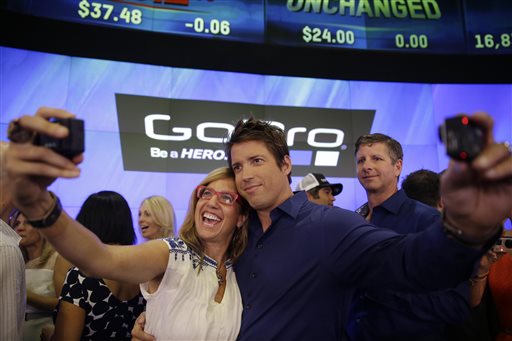
GoPro’s CEO Nick Woodman, right, and his sister, Pilar Woodman, film themselves with GoPro cameras as they celebrate his company’s IPO at the Nasdaq MarketSite in New York, Thursday, June 26, 2014. US stocks Thursday finished modestly lower following disappointing economic data even as shares for video camera maker GoPro soared in its first day of trade. AP PHOTO/SETH WENIG
NEW YORK–US stocks Thursday finished modestly lower following disappointing economic data even as shares for video camera maker GoPro soared in its first day of trade.
The Dow Jones Industrial Average shed 21.38 points (0.13 percent) at 16,846.13.
The broad-based S&P 500 dipped 2.31 (0.12 percent) to 1,957.22, while the tech-rich Nasdaq Composite Index edged down 0.71 (0.02 percent) to 4,379.05.
US consumer spending, which accounts for more than two-thirds of US economic activity, rose a mere 0.2 percent in May after a flat April.
The report put markets in a sour mood, pushing the S&P 500 as low as 1,944.69 early in the session.
The rally in the afternoon is characteristic of “a very complacent bullish environment,” said Michael James, managing director of equity trading at Wedbush Securities.
“You have to be invested. You can’t let the market keep going and not be in it.”
GoPro, which makes small video equipment popular among users of social media, jumped 30.6 percent on the Nasdaq from its initial public offering price of $24 to close at $31.34.
Microblogging company Twitter gained 5.0 percent.
Retailer Bed Bath & Beyond sank 7.2 percent as it projected second-quarter earnings of $1.08-$1.16 per share, below the $1.20 seen by analysts.
Consultancy Accenture lost 1.8 percent as it trimmed its 2014 profit forecast from $4.50-$4.62 per share to $4.50-$4.54.
Tobacco company Philip Morris dropped 2.7 percent as it slashed its 2014 earnings forecast, citing major price discounting at “the low end” of the Australian market and “an improving but weak macro-economic environment in the EU,” among other factors.
Aluminum producer Alcoa gained 2.7 percent after announcing a $2.9 billion purchase of Firth Rixson, a British manufacturer of aerospace jet engine components. Alcoa said the deal would boost its ability to win additional business in the aerospace sector.
Bond prices rose. The yield on the 10-year US Treasury fell to 2.53 percent from 2.56 percent Wednesday, while the 30-year dropped to 3.34 percent from 3.38 percent. Bond prices and yields move inversely.